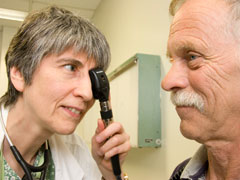CIHR Taps SRI PIs
By Laura Pratt
Canadian Institutes of Health Research (CIHR) has announced the results of its March 2008 competition. Four Sunnybrook Research Institute (SRI) researchers were recognized with awards, which, in all, amount to more than $3.1 million.
Dr. Sandra Black, director of the neurosciences program at SRI, was awarded $282,211 a year for five years. Black will apply these funds to her research into in vivo brain mapping in the dementias. Her longitudinal brain-behaviour study, active since 1995, focuses on interactions of Alzheimer’s and cerebrovascular disease.
“I’m thrilled,” says Black of a prize that was more than double the amount of CIHR’s average annual grant. “This renewal recognizes the needs that we have, like the requirement for a database manager. The reviewer said the group was excellent and the productivity was excellent, and I think that’s what allowed us to succeed in getting a portion of what we [sought]. It’s a reflection of the strong, multidisciplinary team.”
Dr. Juan Carlos Zúñiga-Pflücker was awarded $137,013 a year for five years. This award will fund his study of how T cells mature within the thymus—in particular, molecular analyses of pre-T cell receptor signals that control their development. For Zúñiga-Pflücker, a senior scientist in molecular and cellular biology at SRI and the Canada Research Chair in Developmental Immunology, this grant is a renewal, and will fund research that has already resulted in high-impact publications in journals that include Immunity and Nature Immunology. “Our hope,” says Zúñiga-Pflücker, “is to understand precisely how different T cell lineages are generated in the thymus.”
Dr. Dean Rowe-Magnus will receive $106,550 a year for four years, earmarked for his research into the marine bacterium Vibrio vulnificus, a human and animal pathogen that causes fatal septicemia (bacteria in the blood) and wound infections, and is an excellent model organism to study the biosynthesis, evolution and role of polysaccharides in bacteria. “In light of the high quality of Canadian research and cutbacks in federal funding,” says Rowe-Magnus, a scientist in clinical integrative biology at SRI, “I was elated to have been successful in this round of competition.”
In addition, Dr. Geordi Pang, an associate scientist in imaging at SRI, was awarded a one-year grant for $87,806 for his work in the development of a sophisticated detector aimed at improving the targeting of radiotherapy of the lung such that healthy parts of the organ are spared exposure to radioactive beams. This grant will further Pang’s research into imaging tools—specifically tomographic systems, which slice an image into three dimensions—that focus on the specific part of afflicted tissue, and irradiate them precisely.
Finally, CIHR has awarded Dr. Stuart Foster, a senior scientist in imaging at SRI, $104,977 a year for five years. This money will support Foster’s efforts to develop better ways to create molecular labels for molecules known to be involved in cancer progression. “It’s so that we can follow the effects of drugs and try to understand how they’re actually working, as opposed to how people postulate that they work,” says Foster, who holds the Canada Research Chair in Ultrasound Imaging.
Foster’s goal is to understand the process that results in improved quality of drug delivery—primarily antiangiogenic drugs, which attack the vascular supply of the tumour—especially combination therapies that involve more than one drug. Foster is working with Dr. Bob Kerbel, a senior scientist in molecular and cellular biology at SRI, and holder of the Canada Research Chair in Tumour Biology, Angiogenesis and Antiangiogenic Therapy.
“I feel great about getting the award,” says Foster. “It’s a brutal competition and it’s peer-reviewed at the highest level. If you get one, you’re doing well.”
PDF / View full media release »





